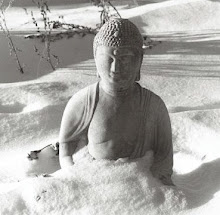Wednesday, August 5, 2009
From the Greek philosopher Parmenides in the fifth century BCE to Beckett and Sartre in the 20th century, the concept of nothing gets pretty bad press, whether pitched as ontological anti-matter or a gut-churning absence of meaning. But the nothing of Zen is entirely different. It’s sometimes more accurately rendered as no-thing, signifying the absence of any single entity separate from the cosmos. Likewise, no-self doesn’t mean I don’t exist, but that I don’t, and can’t, exist apart from the plenum. As Yasutani Roshi (1885-1973) once said, “When you hear about no-self, don’t become sad. Thanks to no-self, the entire universe is self.” A millenium earlier, Yun-Men (d. 949) put it this way: “My body’s so big there’s no place to put it.” Since Zen is vastly different from the discipline of philosophy, the idea is to realize the ground of being directly. The implications are significant. It's impossible to harm another being when one realizes that from horizon to horizon it's all one body. No one knows why, but when we're not in the way, wisdom and compassion replace us.
Subscribe to:
Post Comments (Atom)

Nice. I think people are confused by the whole "no self" thing a lot, especially here in the West.
ReplyDelete